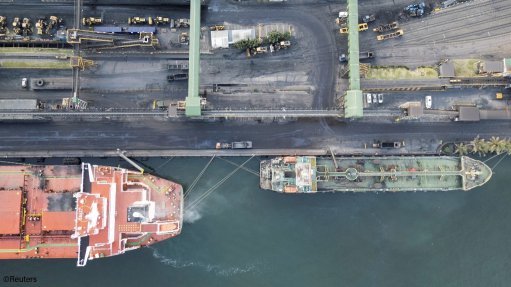Dropping bombs – Part 1
One of the more interesting and terrifying occupations I had in the South African Navy involved the disposal of bombs off the Durban coastline. In fact, using the description “dropping bombs off the Durban coastline” sounds so formal and organised; the actual process was so informal and more or less disorganised as to be almost comical.
Those of you who have read earlier articles concerning Durban Naval Command will know that, during my national service, I was appointed the Command Engineering Officer at Durban Naval Command. This was a very lucky appointment and placed me in a position of authority which I hardly deserved, but this has been discussed elsewhere. In this particular tale, I will write about how I ended up on a ship disposing of bombs off the Durban coast.
It happened like this. I was in the wardroom of Durban Naval Command and ended up talking to two army officers. They were very unhappy because they had been given an appointment to accompany a ship off the Durban coast to some point which had a depth of 600 ft. The ship was, in fact, a small container vessel and was loaded with bombs which had been de-energised. In the 1940s and 50s, these bombs were supposed to form part of the bombing system of various allied countries, but as time passed it was found they were of no use in South African conditions, being primarily useful for bombing European cities.
It had been decided to get rid of these bombs and it had been concluded that the easiest way to do this was to dispose of them at sea or, as a Navy officer may say, throw them over the side. The army officers had done one trip in which the bombs were disposed of but were absolutely not keen to do another, owing to the sea sickness they experienced. They told me their tale.
Now it happens that one of the characteristics I inherited from my mother is that I never suffer from seasickness. Consequently, travelling out to sea as the army officers did would hardly affect me to the degree that they suffered. As it turns out, this was incorrect to a degree. I made various arrangements (at the time, I was in charge of an engineering group) and on the evening of a weekend joined the ship loaded with about 200 bombs. The crew of the ship were all Filipinos and spoke very little English. I spoke very little of their language, but we communicated to a degree, and they smiled a lot and shook their heads. I didn’t understand the shaking of their heads but was to become suitably educated.
It took four hours before we managed to travel from Durban harbour to the point of disposal of the bombs. Once we were there, the captain asked me to verify that we were in the right place. I could not help but notice that the ship rolled to an enormous degree. There was a device which measured the ship’s angle from vertical and this regularly hit maximum and stayed thus orientated for several seconds. One could not but conclude that the ship’s angle reached nearly horizontal at times. I was scared. In fact, I was more than scared – I was terrified.
On occasion, the captain would look at me in a reassuring fashion. I concluded that it was possible that the vessel would roll over and I took my watch off and put it in my pocket so that it would be found, should we go down with all hands.
The movement of the vessel, even bearing in mind that it was designed to do manoeuvres at sea, was extraordinary. The movement of the ship’s crew was even more extraordinary. To begin with, the various parts of the bombs moved with reasonable order off the back of the ship into the ocean, but there were 200 of them and they were not contained in a solid fashion. The whole operation took place at night and in darkness, with the result that I had the feeling that it would be very hard to determine what constituted safe movement. On occasion, the captain would appear and glance at me with a smile which became ever more fixed, while the crew was flung from side to side by the motion of the vessel. More to follow next week.
Article Enquiry
Email Article
Save Article
Feedback
To advertise email advertising@creamermedia.co.za or click here
Press Office
Announcements
What's On
Subscribe to improve your user experience...
Option 1 (equivalent of R125 a month):
Receive a weekly copy of Creamer Media's Engineering News & Mining Weekly magazine
(print copy for those in South Africa and e-magazine for those outside of South Africa)
Receive daily email newsletters
Access to full search results
Access archive of magazine back copies
Access to Projects in Progress
Access to ONE Research Report of your choice in PDF format
Option 2 (equivalent of R375 a month):
All benefits from Option 1
PLUS
Access to Creamer Media's Research Channel Africa for ALL Research Reports, in PDF format, on various industrial and mining sectors
including Electricity; Water; Energy Transition; Hydrogen; Roads, Rail and Ports; Coal; Gold; Platinum; Battery Metals; etc.
Already a subscriber?
Forgotten your password?
Receive weekly copy of Creamer Media's Engineering News & Mining Weekly magazine (print copy for those in South Africa and e-magazine for those outside of South Africa)
➕
Recieve daily email newsletters
➕
Access to full search results
➕
Access archive of magazine back copies
➕
Access to Projects in Progress
➕
Access to ONE Research Report of your choice in PDF format
RESEARCH CHANNEL AFRICA
R4500 (equivalent of R375 a month)
SUBSCRIBEAll benefits from Option 1
➕
Access to Creamer Media's Research Channel Africa for ALL Research Reports on various industrial and mining sectors, in PDF format, including on:
Electricity
➕
Water
➕
Energy Transition
➕
Hydrogen
➕
Roads, Rail and Ports
➕
Coal
➕
Gold
➕
Platinum
➕
Battery Metals
➕
etc.
Receive all benefits from Option 1 or Option 2 delivered to numerous people at your company
➕
Multiple User names and Passwords for simultaneous log-ins
➕
Intranet integration access to all in your organisation


















